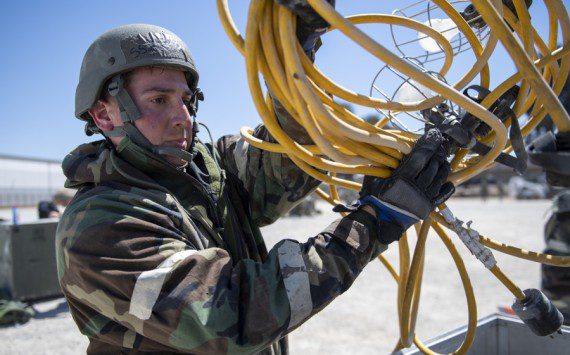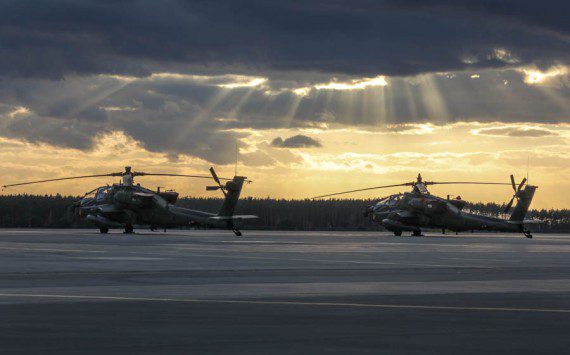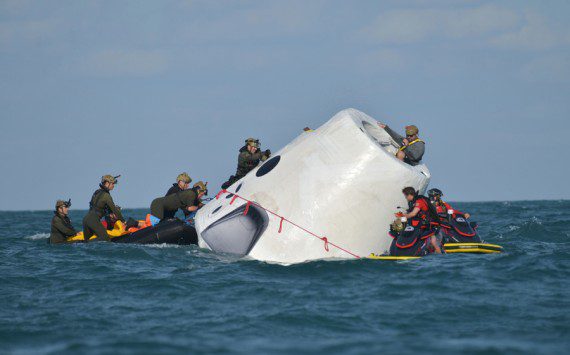Pentagon: Chinese jets fly close to U.S. spy plane
The Pentagon says two Chinese fighter jets flew within about 50 feet of a U.S. Navy reconnaissance plane May 17 in international airspace over the South China Sea.
The Pentagon characterized the incident as an unsafe intercept and said it is being reviewed.
A U.S. military official says the two Chinese J-11 fighters flew out to intercept the U.S. EP-3 Aries aircraft and came so close that they forced the pilot to descend a couple hundred feet in order to avoid a collision. The U.S. surveillance plane was conducting routine operations in the region.
The official says the incident took place in the northern part of the sea, south of Hong Kong. The official was not authorized to discuss details of the incident publicly, so spoke on condition of anonymity. AP
China rejects U.S. claim of unsafe aerial intercept
China May 19 rejected U.S. claims that its fighter jets maneuvered unsafely when they intercepted an American Navy reconnaissance plane over the South China Sea, and demanded that the U.S. end such missions close to Chinese territory.
The Chinese jets monitored the U.S. plane from an acceptable distance and operated in a safe and professional manner, Foreign Ministry spokesman Hong Lei told journalists at a regularly scheduled news briefing.
“According to the related Chinese authorities, the U.S. allegation is not true,” Hong said.
Frequent reconnaissance missions by U.S. Navy vessels’ aircraft off the Chinese coast “jeopardizes China’s sea and air safety,” Hong said. “We urge the U.S. to immediately stop spying activities and prevent such events from happening again,” he said.
The Pentagon said two Chinese J-11 fighters flew within about 15 meters (50 feet) of the U.S. EP-3 Aries aircraft on Tuesday, forcing the U.S. pilot to descend sharply to avoid a collision. It said the U.S. plane was conducting routine operations in international airspace.
It characterized the incident as an unsafe intercept and said it is being reviewed.
The U.S. has sought to prevent such confrontations through frequent communication and the signing of an agreement on handling unexpected encounters at sea and in the air.
However, such incidents may now be on the increase as the U.S. challenges China’s claims that its newly created artificial islands in the South China Sea enjoy legal rights to territorial seas and airspace. China says it is entitled to keep watch over such airspace and seas.
China has long been irked by U.S. reconnaissance missions off the Chinese island province of Hainan, which sits at the northern end of the South China Sea and is home to a number of highly sensitive naval and air installations.
In 2001, a collision between a Chinese fighter jet and a U.S. surveillance plane in which the Chinese pilot was killed and the American crew detained on Hainan led to a crisis in U.S.-China relations. AP
Explosion causes fire at U.S. base in South Korea
An oxygen tank has blown up at a U.S. military base in South Korea, causing a fire, but there were no reports of casualties.
The U.S. military says it is investigating the cause of the blast May 19 at Camp Carroll, 280 kilometers (175 miles) southeast of the Seoul.
The ensuing fire was extinguished in less an hour by 18 firetrucks that rushed to the scene, local officials said.
South Korean media said there were multiple explosions.
Some shrapnel that was scattered by the blasts fell on a nearby farming village and triggered separate fires. But those fires have also been quickly contained and there were no reports of casualties there too.
The United States stations about 28,500 troops in South Korea as deterrence against potential aggression from North Korea. AP
Russian lawmakers back creation of national guard
Russian lawmakers have given tentative approval to forming a national guard, with some saying the Kremlin needs it as a tool against possible unrest.
Members of the lower house, the State Duma, endorsed the bill May 18 in the first of three required readings, with only the communists speaking out against it.
President Vladimir Putin announced forming a national guard last month, saying his former chief bodyguard, Viktor Zolotov, would oversee it. Putin said the force would focus on the fight against extremism and organized crime, but some observers saw its creation as a reflection of Kremlin fears of possible anti-government protests amid an economic downturn.
Communist Vyacheslav Tetekin said during the May 18 debate that setting up a national guard is linked to the worsening social and economic situation in the country. AP











